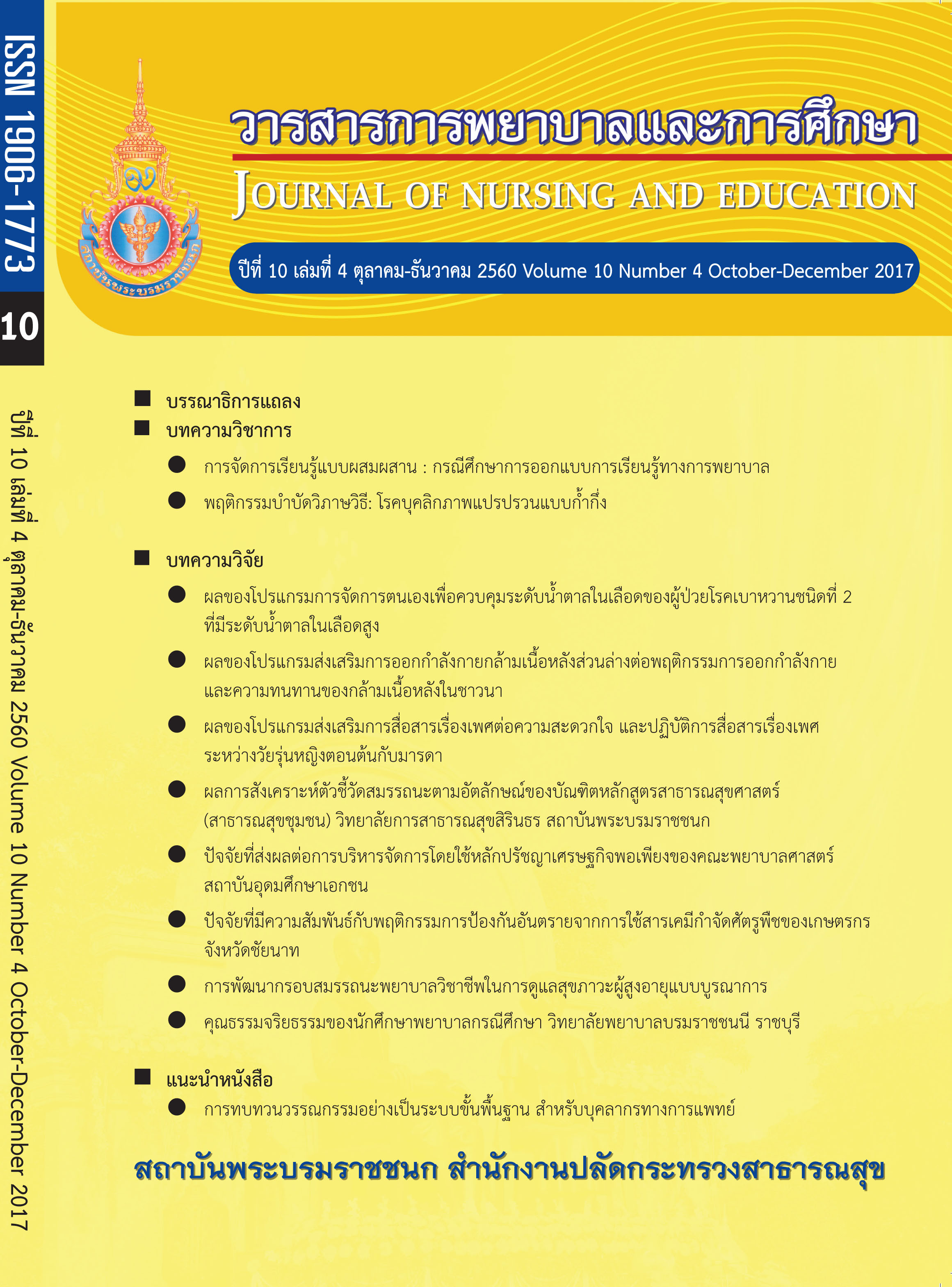ผลของโปรแกรมส่งเสริมการสื่อสารเรื่องเพศต่อความสะดวกใจ และปฏิบัติการสื่อสารเรื่องเพศ ระหว่างวัยรุ่นหญิงตอนต้นกับมารดา
The Effect of Promoting Communication about Sex Program on Feeling Comfortable and Practice in Communication about Sex between Early Female Adolescents and Mothers
บทคัดย่อ
บทคัดย่อ
การวิจัยกึ่งทดลองนี้มีวัตถุประสงค์เพื่อศึกษาผลของโปรแกรมส่งเสริมการสื่อสารเรื่องเพศต่อความสะดวกใจและการปฏิบัติการสื่อสารเรื่องเพศของวัยรุ่นหญิงตอนต้นกับมารดา กลุ่มตัวอย่างเป็นวัยรุ่นหญิงตอนต้นที่มีอายุ 10 -13 ปี ที่กำลังศึกษาชั้นประถมศึกษาปีที่ 4-6 ปีการศึกษา 2559 ของโรงเรียนในเขตอำเภอลำลูกกา จังหวัดปทุมธานี แบ่งเป็นกลุ่มทดลองและกลุ่มควบคุมกลุ่มละ 30 คน คัดเลือกกลุ่มตัวอย่างตามคุณสมบัติที่กำหนด กลุ่มควบคุมจะได้รับความรู้เรื่องเพศเป็นเวลา 2 ชั่วโมง เฉพาะในสัปดาห์แรก ส่วนกลุ่มทดลองจะได้รับโปรแกรมการส่งเสริมการสื่อสารเรื่องเพศ เป็นระยะเวลา 4 สัปดาห์ สัปดาห์ละ 1 ครั้ง
เครื่องมือที่ใช้ในการวิจัยได้รับการตรวจสอบคุณภาพเครื่องมือโดยผู้ทรงคุณวุฒิจำนวน 3 ท่านและหาค่าความเชื่อมั่นของแบบสอบถามโดยใช้สูตรสัมประสิทธิ์อัลฟ่าของครอนบาค ประกอบด้วย 1)โปรแกรมส่งเสริมการสื่อสารเรื่องเพศของวัยรุ่นหญิงตอนต้นกับมารดา 2) คู่มือสำหรับมารดาของวัยรุ่นหญิงตอนต้น 3) การบ้านสำหรับวัยรุ่นหญิงตอนต้น 4) แบบสอบถามข้อมูลส่วนบุคคลของวัยรุ่นหญิงตอนต้น 5) แบบสอบถามความสะดวกใจในการสื่อสารเรื่องเพศ ค่าความเชื่อมั่นเท่ากับ 0.87 6) แบบสอบถามการปฏิบัติการสื่อสารเรื่องเพศค่าความเชื่อมั่นเท่ากับ 0.80 เก็บรวบรวมข้อมูลในเดือนกุมภาพันธ์ถึงเดือนเมษายน 2560 วิเคราะห์ข้อมูลด้วยสถิติความถี่ ร้อยละ ค่าเฉลี่ย ส่วนเบี่ยงเบนมาตรฐานและ สถิติ t-test
ผลการวิจัยพบว่าหลังการทดลอง กลุ่มทดลองมีคะแนนเฉลี่ยความสะดวกใจ และการปฏิบัติการสื่อสารเรื่องเพศ สูงกว่าก่อนการทดลองและสูงกว่ากว่ากลุ่มควบคุมอย่างมีนัยสำคัญทางสถิติ (p<0.05) ส่วนกลุ่มควบคุม คะแนนเฉลี่ยก่อนทดลองและหลังการทดลองไม่แตกต่างกัน
ข้อเสนอแนะ โปรแกรมส่งเสริมการสื่อสารเรื่องเพศทำให้วัยรุ่นหญิงตอนต้นมีความสะดวกใจและสื่อสารกับมารดามากขึ้น สามารถนำมาใช้บูรณาการให้เป็นส่วนหนึ่งของระบบการศึกษาในโรงเรียนเพื่อความต่อเนื่องและยั่งยืนของการสื่อสารเรื่องเพศในครอบครัว
ABSTRACT
The purpose of this quasi - experimental research was to examine effects of the Program for Promoting Communication about Sex between Early Adolescent Females and Mothers focusing on the adolescents’ feeling comfortable and practice in communication about sex. The subjects consist of 60 early - adolescent females aged between 10-13 years old, in primary school’s levels 4-6 in Lamlukka District, Pathumthani Province. Each of the experimental group and the control group consist of 30 early adolescent females. The control group received knowledge about sex for two hours only in the first week. The experimental group received the Program for Promoting Communication about Sex once a week for four weeks. Research tools comprised 1) the Program for Promoting Communication about Sex between Early Adolescent Females and Mother, 2) a handbook for the mothers, 3) homework assignments for experimental group, 4) a questionnaire on the early adolescent females’ personal data and 5) a questionnaire on the early adolescent females’ comfortable on communication about sex and 6) a questionnaire on the early adolescent females’ practice in communication about sex. There were verified by 3 experts and the reliability of the questionnaires was calculated by Cronbach’ alpha coefficient and the 5th and 6th ones yields the Cronbach’ alpha were 0.87 and 0.80 respectively. The research was carried out in February 2017 – April 2017 and data were analyzed for frequency, percentage, mean, standard deviation and t-test.
It was found that the mean score on comfort and practice in communication about sex with mothers of the experimental group, after the experiment, were significant higher than those of the before and the control group at α = 0.05. While there was no significant different in the control group.
The suggestions from the research are that the program for promoting communication about sex encourages early adolescent females to be more comfortable and communicate with their mothers. Hence, it is recommended that the program for promoting communication about sex should be integrated as part of the school education system for the continuity and sustainability of communication about sex in the family.
เอกสารอ้างอิง
1. Geounuppakul, M. Teenage Pregnancy, It is Our Responsibility. Journal of Nursing and Education, 2013; 6 (Special Issue): 33-46. (in Thai)
2. Bureau of Reproductive Health, Department of Health, Ministry of Public Health. Situation of Reproductive Health in Adolescents and Youth, year 2016 [online]. 2017 [cited 2017/10/20]. Available from:
http://rh.anamai.moph.go.th/download/all_file/index/RH@2559.pdf. (in Thai)
3. Bureau of Reproductive Health, Department of Health, Ministry of Public Health. The Adolescent Pregnancy Situation of Thailand. The Pregnancy in Adolescence: A Guideline for Implementation and Evaluation 2. Bangkok: Printing House, Agricultural Co-operative Federation of Thailand Limited, 2014. (in Thai)
4. Ward & Wyatt cited in Wang, N. Parent-Adolescent Communication about Sexuality in Chinese Families. Journal of Family Communication, 2016; 16(3): 229-246.
5. Kritcharoen, S., et al. Developing Parents’ Ability to Give Their Children Sex Education. Songklanagarind Medical Journal, 2009; 27(4): 279-289. (in Thai)
6. Dilorio, et al. Communication about Sexual Issues: Mothers, Fathers, and Friends. Journal of Adolescent Health, 1999; 24: 181-189.
7. Srisuriyawet, R. and Homsin, P. Importance of Mothers’ Communication with Their Daughters Regarding Sex-Related Risks, Mothers’ Attitudes Towards Pre-Marital Sex and Females Teenagers’ Ability to Refuse to Have Sexual Intercourse. Thai Journal of Nursing Council, 2014; 29(3): 31-41. (in Thai)
8. Powwattana, A. The Differences of Parenting Styles on Sexual Communication between Mothers and Adolescent Daughters, Power in Sexual Relationship, Cognitive Strategies Related to Relationship, Sexual Self-efficacy, and Sexual Behavior among Female Adolescents Living in Slums, Bangkok Metropolis. Thai Journal of Nursing Council, 2008; 23(4): 56-71. (in Thai)
9. Bandura, A. Social Learning Theory. Englewood Cliffs, NJ: Prentice Hall, 1997.
10. Suwan, P. Attitude: Measurement of Change and Hygienic Behavior. Bangkok: Peerapattaya, 1983. (in Thai)
11. Burn, N. & Grove, S. K. The Practice of Nursing Research: Conduct, Critique, and Utilization. 4thed. Philadelphia: W.B. Saunders, 2001.
12. Polit, D. F., Beck, C. T., & Hunger, B.P. Essential and Utilization. 5thed. Philadelphia: Lippincott, 2001.
13. Suvarnakuta, P., Congkhaow, T. & Nichachotesalid, P. Effects of Program to Develop Mother’s Skill in Communication about Sex with Early Adolescent Daughters. Journal of Phrapokklao Nursing College, 2015; 26(1): 1-16. (in Thai)
14. Blake, S.M., Simkin, L., Ledsky, R., Perkins, C., and Calabrese, J.M. Effects of a Parent-Child Communications Intervention on Young Adolescents’ Risk for Early Onset of Sexual Intercourse. Family Planning Perspectives, 2001; 33(2): 52-61.
15. Huchison, M.K. The Parent-Teen Sexual Risk Communication Scale (PTSRC-III): Instrument Development and Psychometrics. Nurs Res, 2007; 56(1): 1-8.
16. Si sa-ard, B. Preliminary Research. 8thed. Bangkok: Suviriyasat, 2010. (in Thai)
17. Thipsungwan, K., Srisuriyawet, R., and Homsin, P. Effects of Mother-Participating Program on Sexual Communication between Mother and Early Female Adolescents. The Public Health Journal of Burapha University, 2013; 8(2): 77-88. (in Thai)
18. Bualoy, W., Therawat, M., & Wathanasomboon, P. Effectiveness of the Sex Education Program to Prevent Sexual Risk Behaviors of Grade 8 Students, Sampran District, Nakhonpathom Province. Ramathibodi Nursing Journal, 2014; 20(1): 127-141. (in Thai)






